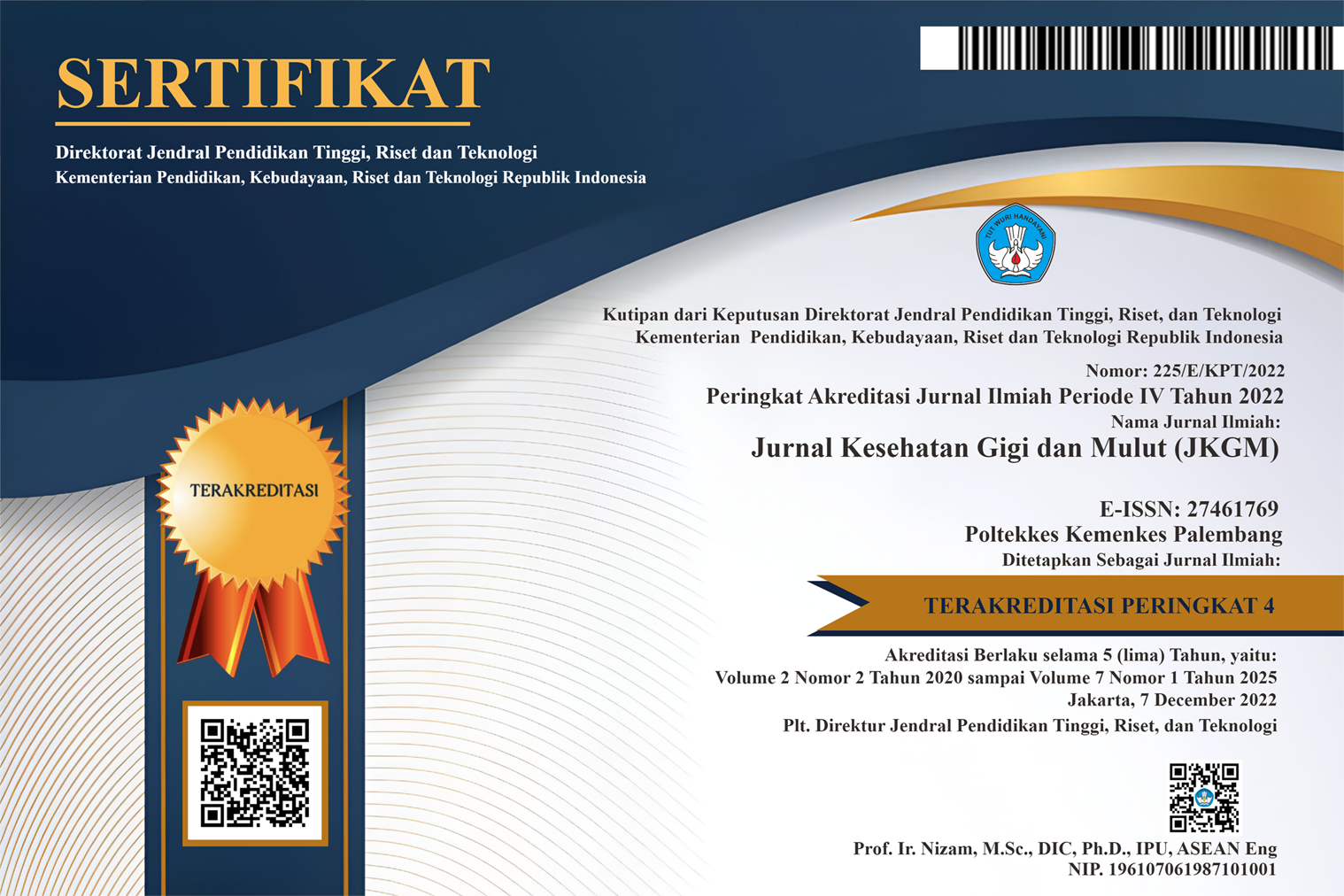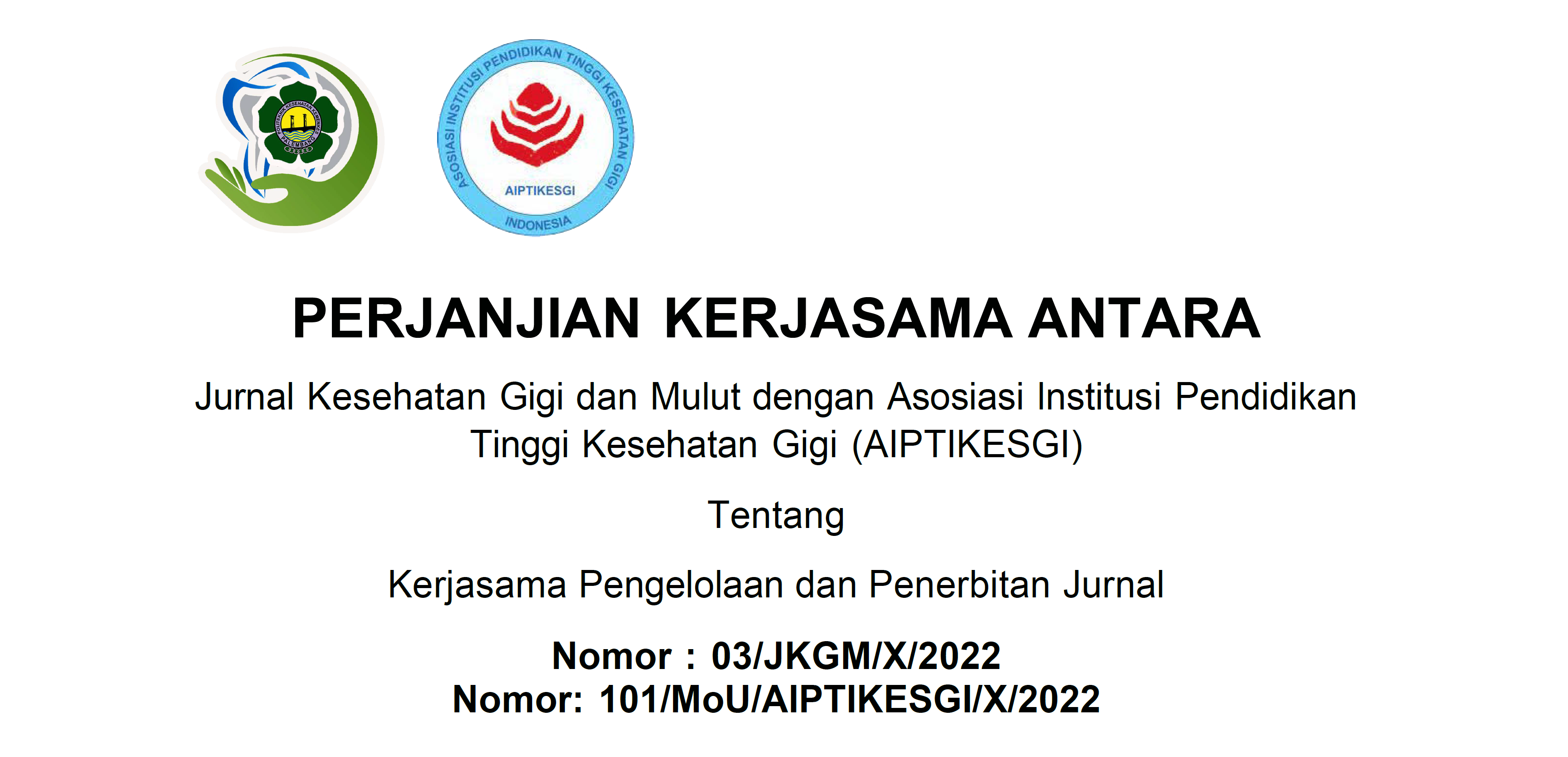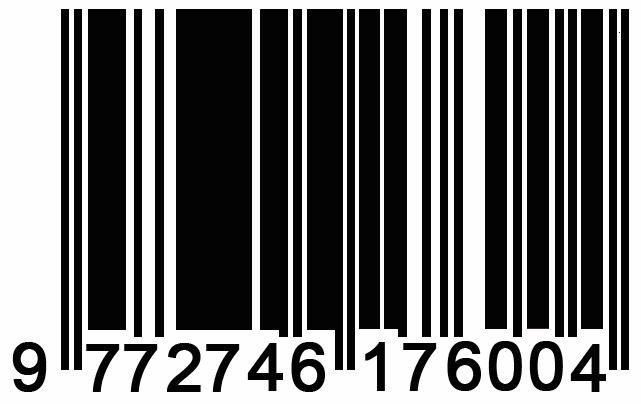SOCIAL SUPPORT ORANG TUA DOWN SYNDROME TENTANG KESEHATAN GIGI BERDASARKAN KARAKTERISTIK TINGKAT PENDIDIKAN DAN PEKERJAAN
Abstract
Latar belakang: Down Syndrom merupakan kondisi genetik yang menyebabkan berbagai tantangan dalam perkembangan fisik dan intelektual. Down syndrom seringkali tidak dapat menjaga kebersihan mulut mereka sendiri, yang dapat menyebabkan masalah kesehatan gigi seperti penyakit periodontal. Oleh karena itu social support dari orangtua sangat dibutuhkan untuk mengatasi kesulitan dalam pemeliharaan kesehatan gigi mereka. Tujuan dari penelitian ini adalah menganalisis social support yang diterima oleh orang tua yang memiliki anak Down Syndrome berdasarkan karakteristik level pendidikan dan pekerjaan.
Metode: Penelitian ini merupakan studi analitik menggunakan pendekatan cross-sectional. Penelitian dilaksanakan di SLB wilayah kota Surabaya melibatkan 14 SLB yang memiliki down syndrom. Responden yang terlibat dalam penelitian ini adalah orangtua down syndrom berjumlah 100 orang, dengan menggunakan teknik simple random sampling. Karakteristik responden diperoleh melalui data primer demografi, sedangakan social support diperoleh melalui pengisian kuisioner. Chi-Square digunakan untuk menganalisis hubungan social support dengan karakteristik pendidikan dan pekerjaan orangtua down syndrom.
Hasil: terdapat hubungan yang signifikan antara tingkat pendidikan dengan social support yang diterima orangtua down syndrom (p value 0.005 < 0.05) ; terdapat hubungan yang signifikan antara pekerjaan dengan social support orangtua down syndrom (p value 0.009 < 0.05)
Kesimpulan: Tingkat pendidikan dan pekerjaan orangtua down syndrom memberikan efek social support yang diterima orangtua down syndrom dalam hal kesehatan gigi anaknya. Kedepannya disarankan untuk mengembangkan program intervensi yang berfokus pada peningkatan pengetahuan dan keterampilan mereka dalam merawat kesehatan gigi anak down syndrom
Kata kunci: Tingkat Pendidikan, Pekerjaan, Social Support .
Abstract
Background: Down Syndrome is a genetic condition that causes various challenges in physical and intellectual development. Down syndrome often cannot maintain their own oral hygiene, which can lead to dental health problems such as periodontal disease. Therefore, social support from parents is needed to overcome difficulties in maintaining their dental health. The purpose of this study was to analyze the social support received by parents who have Down Syndrome children based on the characteristics of education level and occupation.
Method: This study is an analytical study using a cross-sectional approach. The study was conducted in SLB in the city of Surabaya involving 14 SLB with Down syndrome. The respondents involved in this study were 100 Down syndrome parents, using a simple random sampling technique. Respondent characteristics were obtained through primary demographic data, while social support was obtained through filling out a questionnaire. Chi-Square was used to analyze the relationship between social support and the characteristics of education and occupation of Down syndrome parents.
Results: there is a significant relationship between education level and social support received by Down syndrome parents (p value 0.005 <0.05); there is a significant relationship between work and social support of parents with Down syndrome (p value 0.009 < 0.05)
Conclusion: The level of education and work of parents with Down syndrome have an effect on the social support received by parents with Down syndrome in terms of their children's dental health. In the future, it is recommended to develop intervention programs that focus on improving their knowledge and skills in caring for the dental health of children with Down syndrome
Copyright (c) 2024 Jurnal Kesehatan Gigi dan Mulut (JKGM)

This work is licensed under a Creative Commons Attribution-ShareAlike 4.0 International License.
Authors who publish with this journal agree to the following terms:
- Authors retain copyright and grant the journal right of first publication with the work simultaneously licensed under a Creative Commons Attribution License that allows others to share the work with an acknowledgement of the work's authorship and initial publication in this journal.
- Authors are able to enter into separate, additional contractual arrangements for the non-exclusive distribution of the journal's published version of the work (e.g., post it to an institutional repository or publish it in a book), with an acknowledgement of its initial publication in this journal.
- Authors are permitted and encouraged to post their work online (e.g., in institutional repositories or on their website) prior to and during the submission process, as it can lead to productive exchanges, as well as earlier and greater citation of published work















